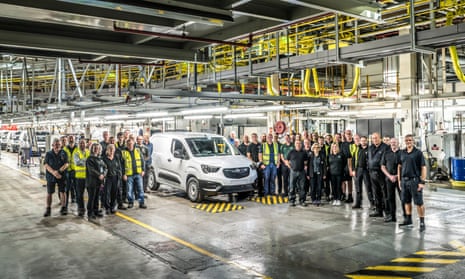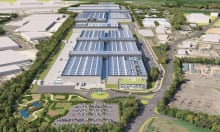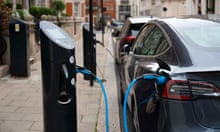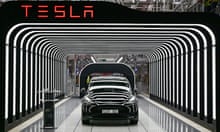In nearly 60 years of making cars Ellesmere Port’s Vauxhall factory had come close to the end several times, said the Unite union convener John Cooper, standing beside the body of an electric van on the production line. Last-minute negotiations saved the plant each time, but it was a close-run thing.
Things have changed now: on Thursday the site began production as the UK’s first factory dedicated purely to producing electric vehicles at scale. It is a landmark moment in the shift away from fossil fuels for the British automotive industry.
The plant, by the River Mersey in Cheshire, will assemble 50,000 electric vans a year under the Stellantis group’s Vauxhall, Opel, Peugeot, Citroën and Fiat badges, with passenger car versions to come next year.
Inside the 1960s shed, newly installed robots trundle around following lines on the floor. They carry 50-kilowatt-hour batteries – enough to go 175 miles – around the plant. The batteries are assembled on-site, using cells from China, before they reach the “marriage” stage of life: being lifted up to be bolted to the bottom of the van’s metal bodies.
Shifting to electric vans before a 2035 ban on new petrol and diesel sales will be a key part of cutting the UK’s carbon emissions to net zero. Carbon emissions from vans have been increasing, in part because of the boom in online retail orders.
“It is vital for the UK to switch to using electric vans to do our bit on climate change and clean up our choking cities,” said Ben Nelmes, chief executive of the New AutoMotive thinktank.
Diane Miller, the factory’s director, said: “We don’t have to worry any more about whether we’ll change away from the internal combustion engine. We’re there.”
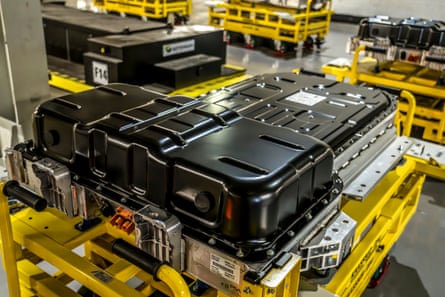
Stellantis decided in 2021 to invest £100m in the future of the plant, which had produced 4.1m Vauxhall cars since 1985. It has invested another £30m to upgrade the press shop, which makes body panels, and to install new electricity generation.
David Bailey, a professor of business economics at the University of Birmingham, said the start of production at the factory was “a major boost for UK auto”. However, Bailey added that post-Brexit tariff rules represented “a large caveat to this good news story”.
New rules at the end of the year will mean that imports of electric cars to the EU – the UK’s largest export market – will face tariffs unless they have enough UK or EU content. That is impossible if relying on cells from China until planned European “gigafactories” catch up.
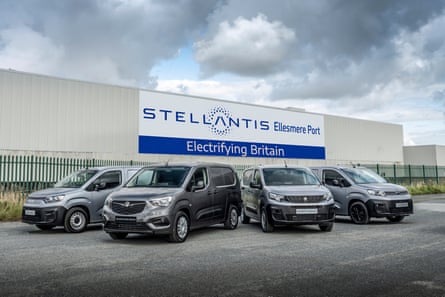
James Taylor, managing director for the Vauxhall brand, argues that electric vehicles are already cheaper than internal combustion engine (ICE) cars on total cost of ownership, but he indicates that tariffs would be a blow. Stellantis, which also produces larger Vauxhall vans in Luton, wants an extension until 2027, and has warned that plants could be at risk otherwise.
“Anything that adds costs into that equation isn’t in anyone’s favour, because we all want to get to a cleaner, greener, electric future as soon as we can,” says Taylor. “Anything that tips that balance in favour of ICE and away from electric isn’t something that would be welcome.”
Ellesmere Port was not always a natural place to become a centre of British carmaking. Although close to Liverpool and Manchester – once Britain’s key port and the heart of the Industrial Revolution respectively – most of the early automotive industry was in the West Midlands or elsewhere.
However, in the early 1960s the then Conservative government pursued a policy of distributing industry. Factories were scattered around the country, although some such as factories in Linwood, Renfrewshire, and Speke, also on Merseyside, fell victim to the turmoil that afflicted the UK car industry – then mostly state-owned – during the 70s and 80s.

Ellesmere Port and the Jaguar Land Rover factory in Halewood, across the Mersey, were among the survivors, and still employ thousands apiece. The JLR factory at Halewood, plus a Ford factory making transmissions next door, have also made it into the electric age.
Kemi Badenoch, the business minister, said the Stellantis investment was “a very visible demonstration that this government has got the right plan for the UK’s automotive sector”.
The start of production at the Vauxhall factory comes after another piece of good news for the UK industry: JLR’s owner, the Indian conglomerate Tata, in July said it would make electric car batteries in the UK, after months of warnings that it was considering Spain.
All large automotive manufacturers in the UK and EU are under pressure from regulators to increase the number of electric cars they sell to try to cut carbon emissions. Stellantis’s electric van production will give it a significant advantage in meeting the new targets, according to Nelmes.
The New AutoMotive chief executive added that when Britain’s zero emissions mandate came into force in January “it would provide a shot in the arm for Vauxhall’s Ellesmere Port-made electric vans”.
